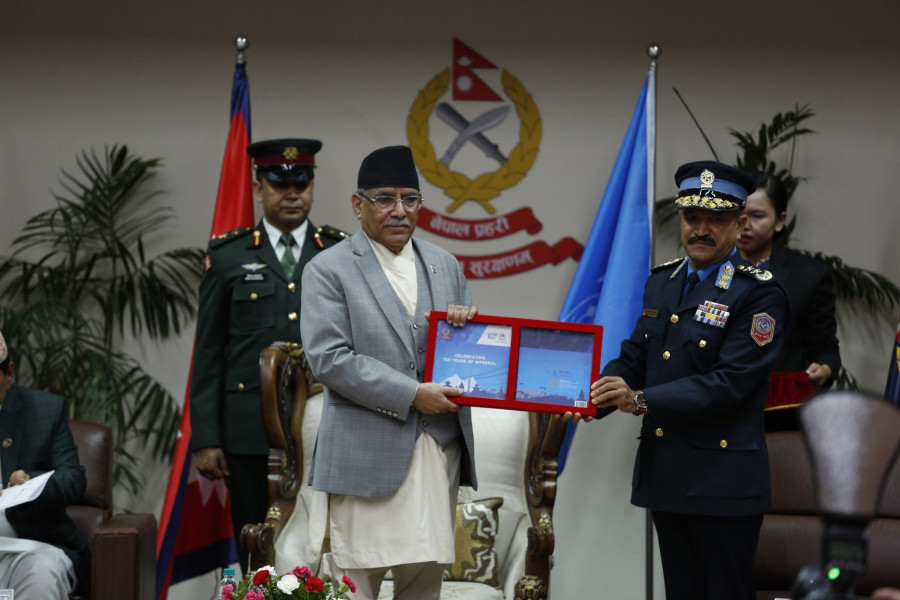National
Nepal Police says it has so far issued 139 red notices
Speakers at an event held in Kathmandu to mark Interpol’s centenary highlighted the importance of its coordination.
Anup Ojha
Over the past three decades, Nepal Central Bureau (NCB) of Nepal Police has issued 139 red notices for wanted persons in coordination with the Interpol, according to a report Nepal Police made public on Thursday. The report was made public on the occasion of the centenary of Interpol’s establishment.
Nepal was nominated as a member of Interpol—the International Criminal Police Organisation—on September 27, 1967 as the 100th member from the 36 General Assembly Session held in Kyoto, 44 years after the inter-governmental organisation was established with the aim to facilitate international police cooperation.
Nepal had issued its first red notice on 27 January 1992 against a fugitive who had escaped from the country’s central jail. The fugitive was later sentenced to imprisonment for 12 years on the charge of attempted murder of a journalist.
Internationally, the first ever red notice was issued in 1947, for a Russian fugitive wanted for the murder of a police officer.
According to the bureau’s report, Nepal in 2018 issued 25 red notices, the highest in a year so far. The second and third highest numbers in a year are 17 and 15.
According to the report, Nepal Police has so far brought back 40 fugitives in coordination with the Interpol.
Based on the nature of crime, the NCB succeeded in bringing back 15 fugitives who were accused of murder while the second-highest number of fugitives (7) who were brought back were involved in gold smuggling cases. The third-highest (4) were involved in human trafficking. Other fugitives brought back with Interpol’s help were related to wildlife crimes (2), foreign employment fraud (2), banking fraud (2), rape (2), cyber crimes (2), kidnapping (2) and forgery (2), the reports says.
The report says Nepal Police issued 97 diffusion notices with the first such notice being issued on June 15, 2009. It issued 24 yellow notices and the first of them was issued on September 11, 2000. Similarly, it issued its first black notice on June 9, 2015, first purple notice on June 11, 2015 and the first blue notice on January 25, 2023.
A red notice is issued for wanted persons, yellow for missing persons, blue to obtain additional information on a person of interest in investigation, black for unidentified bodies, orange for a person representing imminent threat, and purple to provide information on the criminals’ modus operandi. A special notice is issued to inform Interpol’s members that an individual or an entity is subject to UN sanctions.
“This global international cooperation is essential to fight against criminal activities,” said Additional Inspector General Tek Bahadur Tamang, who is also the chief of the Crime Investigation Department.
Addressing a function in the capital on Thursday to release the report, Prime Minister Pushpa Kamal Dahal said the importance of international police cooperation cannot be overstated at a time when criminals are exploiting technology to carry out their nefarious activities.
“The world is facing unprecedented challenges, including the rise of transnational organised crime, cyber threats, and terrorism,” Dahal said. “These threats do not recognise borders and require a collective response from the international community. In this context, I urge all nations to strengthen international cooperation at the global, regional, and sub-regional levels.”
The prime minister also stressed the need to enhance information sharing, intelligence exchange and capacity building to effectively combat these emerging threats.
The function also saw the presence of Home Minister Narayan Kaji Shrestha, Inspector General of Nepal Police Basanta Bahadur Kunwar, ministers and other foreign dignitaries.
Speakers at the function highlighted the importance of Interpol’s coordination in a high-tech world where crime transcends borders.
Meanwhile, in his message on the occasion of Interpol’s centenary, the organisation’s secretary general, Jurgen Stock, appreciated Nepal's cooperation with Interpol.
“Nepal is among the most dynamic and engaged of our member countries,” Stock said. “Since joining Interpol in 1967, NCB Kathmandu has made significant contributions towards tackling global crime across a range of areas.”




 22.65°C Kathmandu
22.65°C Kathmandu.jpg)













